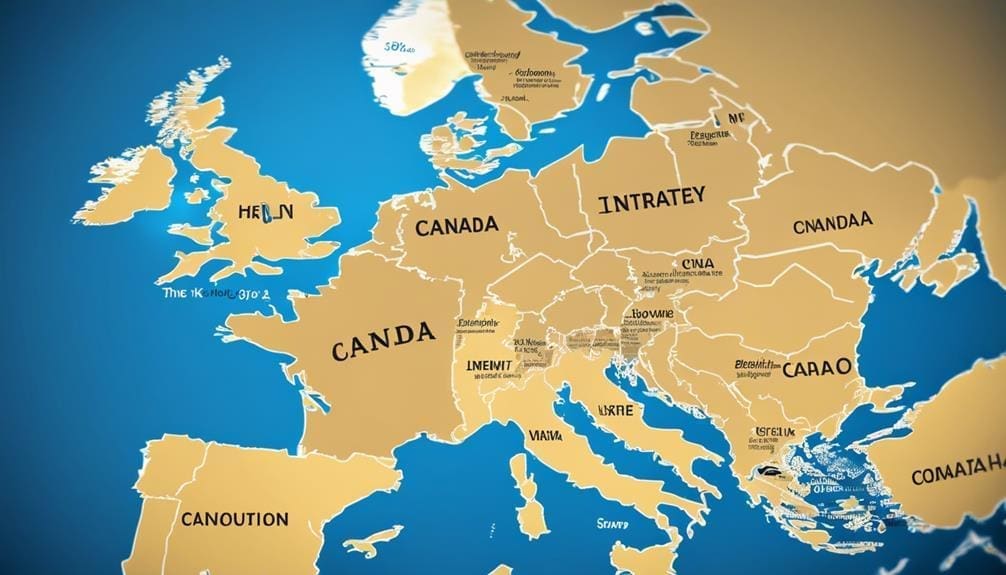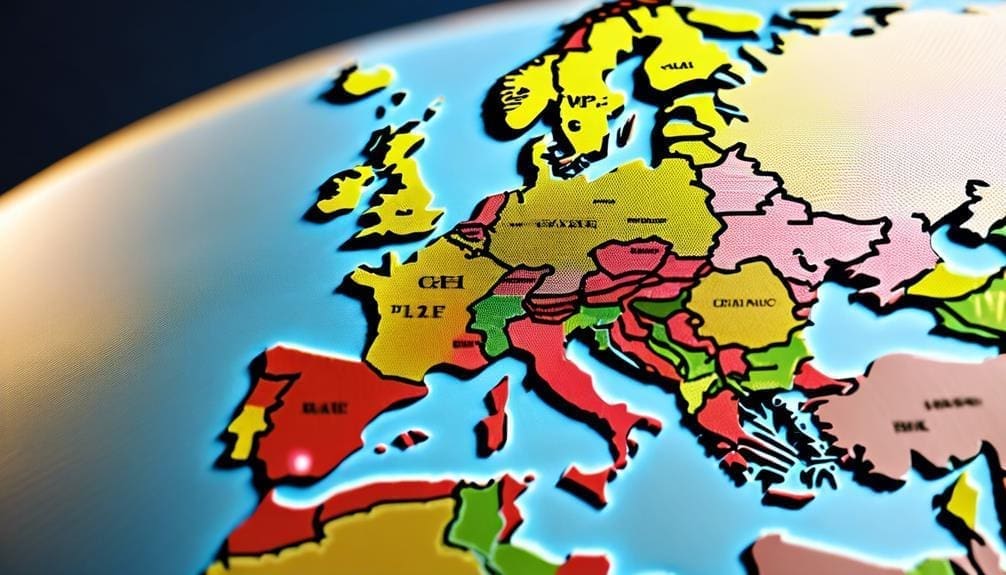If you're looking for countries actively managing international child abduction cases through the Hague Convention, the United States, United Kingdom, Canada, Australia, and France are key players. Each country has a dedicated Central Authority overseeing compliance to guarantee the principles of the Convention are upheld. These nations play vital roles in preventing and resolving international child abductions, demonstrating their commitment to protecting children and promoting international cooperation. Understanding the roles of these countries in the Hague Convention can provide valuable insights into global efforts to address cross-border child abduction cases.
United States
What are the key features of the United States' involvement in the Hague Convention on Protection of Children and Co-operation in Respect of Intercountry Adoption? The United States, through the Department of State's Office of Children's Issues, is actively engaged in managing the country's obligations under the Hague Convention. The Central Authority, designated within the Department of State, oversees the implementation of the Convention's principles and guidelines in intercountry adoption cases. This involvement guarantees that the United States adheres to the standards set by the Hague Conference on Private International Law, promoting cooperation with other Hague Convention Treaty partners.
In cases of International Parental Child Abduction, the United States, in alignment with the Hague Convention, works to prevent and resolve such incidents through established legal frameworks and Family Law protocols. Adoption service providers operating in the U.S. must comply with the Hague Convention standards, ensuring the protection and well-being of children involved in intercountry adoptions. The Department of State, in coordination with the Department of Foreign Affairs, plays a significant role in managing the United States' commitment to the Hague Convention on Protection of Children and Co-operation in Respect of Intercountry Adoption.
United Kingdom
The United Kingdom, as a member of the Hague Convention on the Civil Aspects of International Child Abduction, plays a significant role in facilitating cooperation with other member countries to address international child abduction cases. Under the Hague Convention framework, the United Kingdom has established a Central Authority dedicated to handling matters related to international child abduction. This Central Authority serves as the primary point of contact for communication and coordination with other member countries when resolving cases of child abduction.
Canada

Canada actively participates as a signatory to the Hague Convention on the Civil Aspects of International Child Abduction, demonstrating its commitment to addressing cross-border abduction cases efficiently. Under this convention, Canada's Central Authority manages applications and requests related to international child abduction. The country has put in place specific procedures to guarantee the prompt return of children who have been wrongfully removed or retained across borders. By being a member of the Hague Convention, Canada gains access to a framework that promotes cooperation with other member countries in resolving abduction cases swiftly and effectively. This cooperation is essential in safeguarding the well-being and rights of children involved in these challenging situations. Through its involvement in the Hague Convention, Canada shows dedication to international standards aimed at preventing child abduction and ensuring the proper handling of such cases to protect the children and families affected.
Australia
Australia, also a signatory to the Hague Convention on the Civil Aspects of International Child Abduction, plays a significant role in efficiently handling cross-border abduction cases. The Australian Central Authority, located within the Attorney-General's Department, oversees the implementation of the 1980 Hague Convention in the country. Through this mechanism, Australia follows a well-defined legal procedure to facilitate the return of abducted children to their home country, ensuring compliance with international regulations aimed at safeguarding children's welfare. Moreover, the Hague Convention enables Australian parents to seek contact or access to children who have been wrongfully removed to another country. In addition to its Hague Convention commitments, Australia has established bilateral agreements with certain non-Hague countries to provide legal assistance in matters concerning child welfare. These initiatives collectively reflect Australia's dedication to upholding the principles of the Hague Convention and protecting the rights of abducted children and their families.
France

Being a member of the Hague Convention on the Civil Aspects of International Child Abduction, France actively participates in resolving cross-border abduction cases through established procedures. The Hague Convention serves as a framework for cooperation between France and other member countries, ensuring the prompt return of abducted children to their habitual residence. In France, the Central Authority plays an essential role in implementing the Hague Convention provisions for child abduction cases, emphasizing the protection of children and the importance of international cooperation. By adhering to the Hague Convention, France demonstrates its commitment to preventing and resolving international child abductions, showcasing a dedication to the well-being and safety of children involved in such delicate situations. Through the outlined procedures and mechanisms provided by the Hague Convention, France works diligently to facilitate the resolution of international child abduction cases, highlighting the significance of collaborative efforts in safeguarding children's rights and ensuring their welfare.
Frequently Asked Questions
How Many Countries Are in the Hague Convention?
When you ask about the Hague Convention, you're diving into a global network of child protection. It's not just about numbers; it's about cooperation, legal standards, and safeguarding little ones. Being part of this pact brings many advantages, from streamlined processes to international recognition. You'll navigate through document requirements, cultural nuances, and legal implications with ease. The Hague Convention is your guide, ensuring that children's best interests are at the forefront.
What Countries Do Not Participate in the Hague Convention?
When a country doesn't participate in the Hague Convention, it can bring legal implications, affecting international recognition and complicating efforts to handle cross-border disputes like child abduction cases. Without the standardized procedures of the Convention, alternative legal options may vary, impacting international adoptions and leading to challenges with notarization and legalization processes. Extradition complications may arise, emphasizing the importance of understanding a country's Hague Convention status before pursuing legal actions.
Are the USA Part of the Hague Convention?
Yes, the USA is part of the Hague Convention. Its involvement carries legal implications, ensuring a robust legal framework for resolving international child abduction cases. Through international agreements, the USA upholds treaty obligations, fostering diplomatic relations and international cooperation. This commitment provides legal protections, addressing cross-border disputes and jurisdictional issues effectively. The USA's participation in the Hague Convention reflects its dedication to preventing and resolving international child abduction cases promptly.
What Countries Are Part of the Hague Apostille Convention?
When it comes to the Hague Apostille Convention, the member countries play a significant role in facilitating the apostille process for document authentication. They accept apostilled documents from each other, which aids in meeting legalization requirements for international use. This process streamlines the recognition of notary public services, consular services, and diplomatic missions abroad. It guarantees that official documents bear international recognition through cross-border agreements, making notarial services more accessible and efficient.

